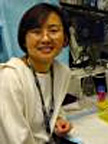
 | Rita Shiang
Research interests A large focus of the laboratory is the characterization of the Treacher Collins syndrome gene. The protein treacle has homology to a family of nucleolar phosphoproteins but the function of the protein and its role in craniofacial development is not known. The mouse homologue of the protein has also been identified. The developmental expression of the gene has been delineated using whole-mount mouse in-situ hybridization and the gene is expressed in an appropriate temporal and spatial manner. In addition, the protein has been confirmed to be a nucleolar phosphoprotein by localization studies using GFP-fusion constructs and phosphorylation studies. The protein is phosphorylated in a cell-cycle dependent manner. Current studies include the use of yeast-two hybrid screens to identify protein partners for treacle and the construction of a conditional knockout mouse model for Treacher Collins syndrome. | ||||||